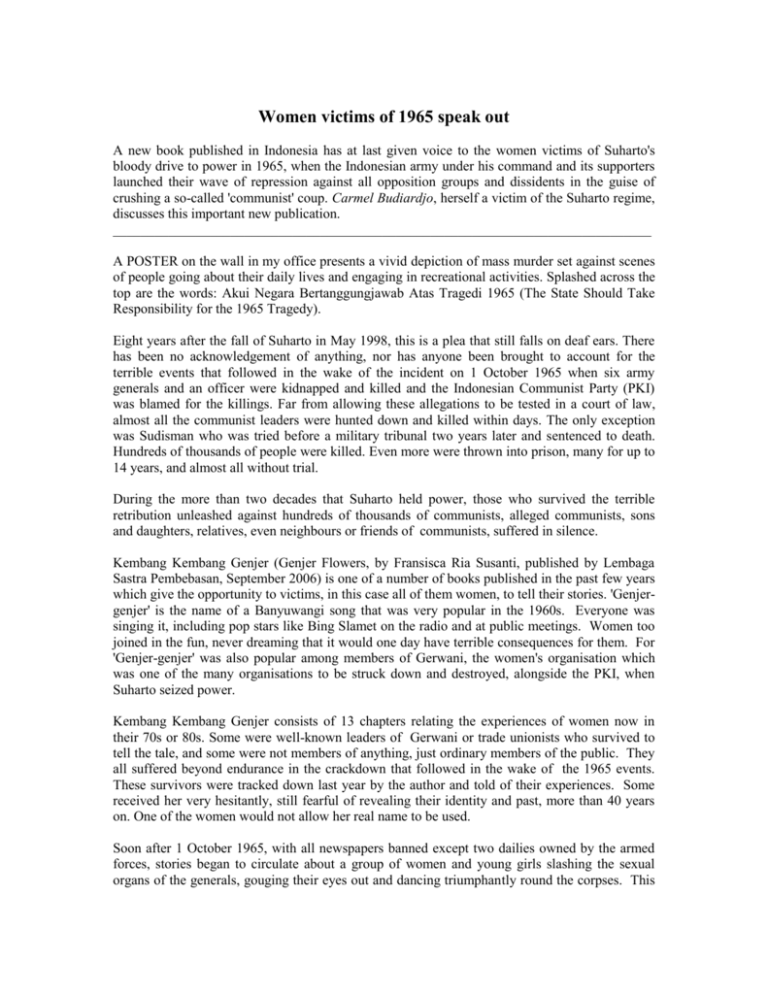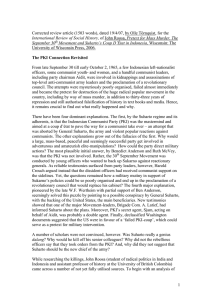Women victims of 1965 speak out
advertisement

Women victims of 1965 speak out A new book published in Indonesia has at last given voice to the women victims of Suharto's bloody drive to power in 1965, when the Indonesian army under his command and its supporters launched their wave of repression against all opposition groups and dissidents in the guise of crushing a so-called 'communist' coup. Carmel Budiardjo, herself a victim of the Suharto regime, discusses this important new publication. ______________________________________________________________________________ A POSTER on the wall in my office presents a vivid depiction of mass murder set against scenes of people going about their daily lives and engaging in recreational activities. Splashed across the top are the words: Akui Negara Bertanggungjawab Atas Tragedi 1965 (The State Should Take Responsibility for the 1965 Tragedy). Eight years after the fall of Suharto in May 1998, this is a plea that still falls on deaf ears. There has been no acknowledgement of anything, nor has anyone been brought to account for the terrible events that followed in the wake of the incident on 1 October 1965 when six army generals and an officer were kidnapped and killed and the Indonesian Communist Party (PKI) was blamed for the killings. Far from allowing these allegations to be tested in a court of law, almost all the communist leaders were hunted down and killed within days. The only exception was Sudisman who was tried before a military tribunal two years later and sentenced to death. Hundreds of thousands of people were killed. Even more were thrown into prison, many for up to 14 years, and almost all without trial. During the more than two decades that Suharto held power, those who survived the terrible retribution unleashed against hundreds of thousands of communists, alleged communists, sons and daughters, relatives, even neighbours or friends of communists, suffered in silence. Kembang Kembang Genjer (Genjer Flowers, by Fransisca Ria Susanti, published by Lembaga Sastra Pembebasan, September 2006) is one of a number of books published in the past few years which give the opportunity to victims, in this case all of them women, to tell their stories. 'Genjergenjer' is the name of a Banyuwangi song that was very popular in the 1960s. Everyone was singing it, including pop stars like Bing Slamet on the radio and at public meetings. Women too joined in the fun, never dreaming that it would one day have terrible consequences for them. For 'Genjer-genjer' was also popular among members of Gerwani, the women's organisation which was one of the many organisations to be struck down and destroyed, alongside the PKI, when Suharto seized power. Kembang Kembang Genjer consists of 13 chapters relating the experiences of women now in their 70s or 80s. Some were well-known leaders of Gerwani or trade unionists who survived to tell the tale, and some were not members of anything, just ordinary members of the public. They all suffered beyond endurance in the crackdown that followed in the wake of the 1965 events. These survivors were tracked down last year by the author and told of their experiences. Some received her very hesitantly, still fearful of revealing their identity and past, more than 40 years on. One of the women would not allow her real name to be used. Soon after 1 October 1965, with all newspapers banned except two dailies owned by the armed forces, stories began to circulate about a group of women and young girls slashing the sexual organs of the generals, gouging their eyes out and dancing triumphantly round the corpses. This image of unspeakable depravities by women was intended to incite moral outrage and was instrumental in setting alight the forces that rallied to the call to kill communists and annihilate the PKI. The ruse was unbelievably successful and the entire progressive movement, not just the PKI, was destroyed. Many years later, the Cornell scholar Benedict Anderson discovered documents that showed conclusively that the bodies of the generals had never been mutilated, showing that these stories were a pack of lies. As Professor Saskia E Wieringa says in her foreword to Kembang Kembang Genjer, no one has yet explained who it was who thought up the idea of spreading these lurid fantasies about what those young women were alleged to have done. 'Their homes and livelihoods were destroyed, their children traumatised, they were deserted and many members of their families were dismissed from their jobs or prevented from going to university.' Here are summaries of the experiences of four of the women interviewed by the author: Sumilah, then aged 14, was arrested on 19 November 1965, and was to spend 14 years in detention, much of the time at the Plantungan prison camp in Kendal, Central Java. She had no idea why she had been picked up along with 47 others but thinks it was because she was fond of singing 'Genjer-genjer'. Later it turned out that it was a case of mistaken identity; she had been mistaken for her mother who was active in a teachers' organisation. When her mother was captured, this didn't lead to Sumilah's release. As fate would have it, she spent 14 years in detention while her mother spent 'only' four years. Sumilah describes how during her incarceration in a women's prison, she was lacerated with a knife, whipped and burnt with cigarettes on her naked body. I can personally vouch for the fact that many girls in their early teens were arrested and held for years, simply because they had been discovered at Lubang Buaya, which is where the bodies of the murdered generals were taken. They had been taking part in exercises that were being organised at the time by various political parties, as part of the mobilisation of the population in Sukarno's campaign against the establishment of Malaysia. They were still youngsters when I met them in Bukit Duri women's prison in 1969 and were quite clearly clueless about politics. We used to call them 'the children'. Tarni is the widow of Nyoto, who was deputy chairman and a member of the Politbureau of the PKI. She herself was not interested in politics and joined no organisation. Not long after a previous boyfriend died, she started getting letters (sometimes twice a day) and poems from Nyoto, whom she had met with a friend, and they subsequently got married. By October 1965, they had six children and Tarni was pregnant with their seventh child. The eldest of her children was called Svetlana, a name which she stopped using after 1965 because it sounded suspiciously like a Russian name. On that fateful day, Nyoto was in North Sumatra and a friend warned Tarni that she was in danger and should leave home immediately though she had no idea what had happened. Their chauffeur drove her and her small children to the home of an acquaintance but he refused to take them in. So, as their own home had been smashed to pieces, she fled with the children to a house that had been given to Nyoto by the PKI as his official residence. After arriving back from Medan, Nyoto thought that by wearing his ministerial uniform, he would be safe from bodily harm (he was shot dead not long after). But it soon became apparent that the official residence was unsafe. They decided to take three children each in search of sanctuary. 2 But the house where Tarni took refuge was attacked and the two of them moved the whole family to the home of a colonel friend where she stayed for a while. From then on, she and the children moved from house to house, often being allowed to stay for only one night. Sometimes they stayed in one place during the day and moved somewhere else for the night. Tarni said that she was never physically attacked and thinks this may have been because she was acquainted with Tien, the wife of Suharto. Whether that was true or not, it did not prevent her from being driven from pillar to post, simply for being the wife of a communist leader. When they then found refuge at the office of a student organisation, she saw Nyoto briefly for the last time. She stayed there till after her seventh child was born, but this house was later raided by the military. This led to her own arrest, with all the children. After a period of freedom, she was re-arrested in Central Java and held in several prisons until eventually being moved to Plantungan where she was held till 1979, after being separated from the children. One of her daughters later wrote a book, Humanitarian Tragedy 1965-2005, in which she recalls hearing people being shot dead when she was only four years old. They have never been able to discover where Nyoto was buried. But the oldest daughter now calls herself Svetlana again and they feel no rancour against their father. Sudjinah was one of the four women who were put on trial. Their crime? That they had engaged in political activities after the events of October 1965. During the months after the event, when President Sukarno was trying to stop the killings by issuing a Command and all newspapers with the exception of the two dailies owned by the armed forces had been banned, Sudjinah and several other women started to produce a bulletin called 'Implement the Command of President Sukarno'. They were hoping to prevent Suharto from seizing power from the President. But after being discovered, Sudjinah was arrested and severly beaten. Rattan was used to lacerate her whole body. She hails from an aristocratic family in the Surakarta court, and took a degree at Gadjah University, Yogyakarta. After becoming involved in pro-independence activities, she joined Gerwani and was sent abroad several times to attend international gatherings. The reports she sent home were published in Harian Rakjat, the newspaper of the PKI. Then Gerwani appointed her to represent them at the WIDF, the Women's International Democratic Federation. With a good knowledge of languages, she later became an interpreter at the organisation's head office, and met many of the foreign delegates who visited Gerwani. But it was her journalistic experience which led her to start producing a bulletin after the events of October 1965. Along with three other women activists who, against great odds, tried to carry out political work, she was put on trial in the late 1970s. Sudjinah was sentenced to 18 years and the three others received sentences of 20, 18 and 15 years. The four women were held in strict isolation from other political prisoners in Bukit Duri prison and only allowed to have contact with women criminal prisoners who were held in a separate block. One of Sudjinah's co-defendants was Sri Ambar, head of the women's section of the left-wing trade union organisation, SOBSI. I had the good fortune to meet her occasionally in the days before 1965. She was a woman of great character, very self-confident and sociable. After her arrest she was subjected to days of brutal beatings in an attempt to make her reveal the whereabouts of a young activist but she stood firm. They even arrested her mother whom they 3 beat in front of her, hoping to break her spirit, but she refused to say anything, encouraged by her mother. When I myself was arrested, even some of the army guards spoke with incredulity about her resilience in the face of the terrible brutalities to which she was subjected. To me, she was a model of defiance. Many years later in 2000, when I met a group of women in Jakarta with whom I had spent time in prison, Sri Ambar was present; she was deaf, hardly able to comprehend what was going on and was unable to move without assistance or to function physically in any way. She was a shadow of her former self. Another of the four women was Sulami, who was released after serving a 20-year sentence. After her release, she decided to start exhuming the bodies of some of the people who were murdered in the crackdown that followed the incident on 1 October 1965, so that their families could give them a decent burial. But when they began the exhumations, they were set upon by thugs from some Muslim groups who accused them of trying to revive the PKI. So the exhumations were halted for fear of provoking bloodshed. For years after the fall of Suharto, Sudjinah was still able to write and make a living from doing translations. It was Sudjinah who translated my book, Surviving Indonesia's Gulag, into Indonesian. When she met the author of Kembang Kembang Genjer, Sudjinah was walking with great difficulty and had difficulty remembering things from the present though her memory of the past was still strong. She was being cared for by a small community of women. Kusnah also walks with great difficulty because one leg is crippled from the after-effects of kicks she sustained from soldiers wearing heavy boots. She described the beatings she received and spoke about being repeatedly struck across the mouth and face, causing heavy bleeding; she lost several teeth during the torture sessions. She was held for a time at a notorious army command post called Posko in Gunung Sahari, Jakarta. She was frequently 'borrowed' (dibon) by other units, moving from one place to another. On one occasion she was tied up and left out in the open for the night, during a thunderstorm and in the pouring rain, with a dog barking at her heels. Her captors expected her to die but somehow she survived. Her sufferings were not only physical. Whenever she was interrogated, the officers bared their genitals and told her to engage in oral sex. When she refused, the beatings were resumed. Before 1965, she worked for Unilever and was active in the local trade union. She was sacked in 1966 and arrested soon afterwards. She and her husband Harsodiono, who was also arrested but for a shorter period, had 12 children. In order to ensure that her children would receive parental care, she persuaded the military to release her husband and regard her as a hostage if he ran away. He was released but she remained in detention for more than 10 years. Like so many other women prisoners, Kusnah ended up in Plantungan, the camp which had been an isolation camp for sufferers of leprosy. The camp had long since been abandoned and the barracks were in a terrible state, with snakes slithering around almost every day. She was particularly incensed about the camp commander, Prayogo, who stole the food and clothing sent by church organisations for the prisoners. On one occasion, he stole a load of shoes from Belgium, sold them and kept the proceeds. He also sought sexual favours from the prisoners, some of whom later became pregnant. 4 But she also spoke warmly of villagers living near the camp. At first they called the women 'violators of generals' bodies' and 'prostitutes' but gradually their opinions changed and they started surreptitiously sending in food packets despite warnings from the military that helping the prisoners could lead to their homes being burnt down. In her concluding remarks, the author writes: 'For decades, the state has never acknowledged their existence. These days, they expect nothing from the state. Unlike other citizens who are issued identity cards for life, they must have their identity cards renewed every five years. 'They have found their own way of surviving. They have developed a very moving solidarity among themselves in a state that has betrayed its own citizens.' A worthy tribute to women who even today are still traumatised by the terrible things that happened to them so long ago. Carmel Budiardjo is founder of TAPOL, the Indonesia Human Rights Campaign. The above article is reproduced from TAPOL Bulletin (No. 186, April 2007). Third World Resurgence No. 201, May 2007 5








